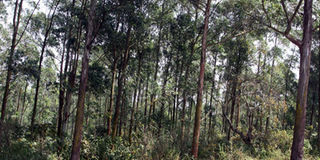Leaders decry rampant encroachment on land

Affected. A section of Butebe Forest Reserve in Karambi Sub-county, which has reportedly been encroached on by people who have grown eucalyptus trees in the forest. PHOTO BY SCOVIA ATUHAIRE
What you need to know:
- Kabarole Chief Administrative Officer, Dustan Balaba, says inadequate funding has hindered the surveying of public land and providing tittles.
- According to report by the Rwenzori Anti-corruption Coalition (RAC), in 2017, several pieces of public land in Rwenzori sub-region have been encroached on, while others have been grabbed by government officials and other individuals.
- In Kasese District, several pieces of land are under investigation for alleged encroachment and grabbing.
KABAROLE/BUNYANGABU: For several years, Kabarole District local government has failed to secure titles for the public land and this has accelerated land grabbing and encroachment in the district.
About 90 per cent of public land in Kabarole and Bunyangabu districts has never been surveyed and, therefore, lacks titles.
This has become a stepping stone for encroachers to grab public lands. The land question continues to be a big concern in Kabarole and Rwenzori sub-region as a whole.
Cases of land grabbing, encroachment and illegal land give-aways have persistently been reported year after year. This has accelerated conflict, violence and sometimes deaths in the area.
One of the cases is that of Butebe Forest Reserve in Karambi Sub-county, which has reportedly been encroached on.
In 2011, the Inspector General of Government (IGG) received complaints from residents of Butebe parish in Karambi Sub-county that the forest reserve had been encroached on by individuals.
The IGG carried out investigations and established that the implicated individuals encroached on about seven and 13 acres of the forest reserve and set up a dairy farm and planted eucalyptus trees, respectively.
The IGG further indicated that after encroaching on the forest reserve, the implicated individuals applied to Kabarole District land board to purchase leases for the same land they had illegally acquired.
The district land board went ahead to lease the land to the said encroachers.
The IGG recommended that the leases be revoked and the culprits be evicted, but the district administration has never implemented the IGG’s recommendations.
The area councillor, Mr Joseph Mashuhuko, says the sub-county leadership was not consulted when they were leasing out the forest reserve.
Mashuhuko says when the forest reserve was encroached on, it became difficult for leaders and residents in the area to access it.
“The forest reserve is a source of income for the sub-county through selling firewood to residents and awarding permits to those who want to plant trees,” Mashuhuko says.
Officials speak out
Kabarole District lands officer, Peter Alinda, says they couldn’t implement the recommendations without first opening the boundaries to ascertain which part of the reserve was encroached on by the implicated individuals.
According to Alinda, a survey on the reserve was carried out and a report was compiled and submitted to the district executive committee for action.
Butebe Forest Reserve was gazetted in 1953. It was then declared a central government forest reserve in 1967 and in 1988, management of the forest reserve was decentralised to Kabarole District Local Government.
Despite efforts made by the district administration, there is no land title for Butebe Forest Reserve and this has given a lee-way to individuals with selfish interests to encroach on government land.
The forest is not the only public land that has been encroached on. According to Mashuhuku, other public lands in Kabarole and Bunyangabu districts that have been encroached on include; plot 14/16 Kabafumu Road, Rwensenene cattle dip tank, Kibota dip tank, Kabonero Health Centre III, Kabonero Bidiipa land (cattle dip) and Karambi parish hall, among others.
Inadequate funding
However, the Kabarole Chief Administrative Officer, Dustan Balaba, says inadequate funding has hindered the surveying of public land and providing tittles.
Alinda says the lands department is very sensitive but it has been affected by the budget allocation.
“The allocation of funds to that cause is lacking because survey and mapping is allocated Shs48,000 per quarter, which is not enough,” he reasons.
When kingdoms were abolished in 1962 by then president Apollo Milton Obote, some kingdom land was taken by government in trust.
When president Museveni came to power in 1986, he restored kingdoms in 1993, which included Tooro, but some of the land that was already in the hands of government was not returned to the Kingdom.
Since then, Tooro Kingdom has been struggling to get its assets back; whereas some were returned, others are still in the hands of government.
Rampant vice
The vice. According to report by the Rwenzori Anti-corruption Coalition (RAC), in 2017, several pieces of public land in Rwenzori sub-region have been encroached on, while others have been grabbed by government officials and other individuals.
Affected land. In Bundibugyo District, land belonging to Bitoogo Primary School was encroached on by some community members, who claimed ownership.
In Kasese District, several pieces of land are under investigation for alleged encroachment and grabbing. These include, among others; Mubuku irrigation scheme, Rukoki-Bataka, Hima Ibuga health centre, Nkoko land and Kabukero.
RAC recommended that all district local governments should endeavour to have all their lands surveyed and obtain tittles for them.
Rwenzori sub-region is still a hotbed of ethnic and land wrangles and little efforts have been done to solve this.



